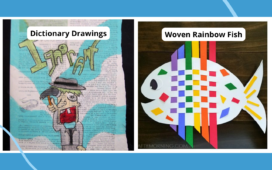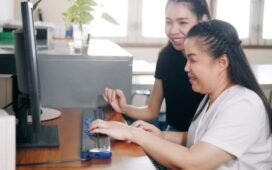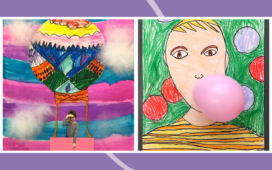
Breaking The Mold: Creative Strategies For Peer Learning
In today’s work landscape, the traditional approach to learning is evolving, and peer learning is emerging as a game changer. It’s not just about attending seminars or workshops anymore; it’s about harnessing the collective wisdom and diversity within our teams to drive continuous growth. Picture this: a vibrant learning community where colleagues actively engage with each other, exchanging insights, experiences, and innovative ideas. That’s the power of peer learning. By implementing these strategies for peer learning and encouraging learners to teach and support each other, we create an environment where knowledge resonates, endures, and transforms into action.
Thinking Outside The Box: Utilizing Innovative Strategies For Peer Learning
Thinking outside the box and embracing innovative strategies for peer learning offers numerous advantages over traditional training techniques. Traditional methods often rely on passive learning approaches, such as lectures or standardized modules, which may lead to disengagement and limited retention of information. In contrast, innovative strategies like art-based reflection sessions, book clubs, and design thinking workshops foster active participation, creativity, and collaboration among employees. By encouraging learners to explore diverse perspectives, experiment with new ideas, and engage in hands-on activities, these strategies stimulate critical thinking, problem-solving skills, and intrinsic motivation. Moreover, they create a dynamic learning environment where employees feel empowered to take ownership of their learning journey and contribute their unique insights and experiences. As a result, implementing these innovative approaches not only enhances the effectiveness of training but also fosters a culture of continuous learning, growth, and innovation within the organization.
Art-Based Reflection Sessions
Step into an art-based reflection sessions, where creativity meets professional development. Through mediums like painting, drawing, or sculpting, participants visually represent their experiences, challenges, and aspirations. It’s not just about creating art; it’s about exploring individual growth and learning trajectories in a collaborative setting. As colleagues offer constructive feedback and mutual inspiration, we deepen our understanding of our professional journey and foster a culture of shared learning and mentorship.
Book Clubs
Let’s dive into the world of books, articles, and podcasts together with a book club initiative. Here, we explore key concepts, themes, and takeaways in a collaborative and supportive environment. Through discussions and reflections, we gain new insights, perspectives, and strategies for personal and professional growth. It’s more than just reading; it’s about building camaraderie, exchanging ideas, and supporting each other’s learning journey.
Community Learning Pods
Join community learning pods, where small groups collaborate on learning projects, challenges, or experiments based on shared interests or goals. In these pods, we share resources, insights, and experiences, holding each other accountable for our learning goals. Through regular meetings, discussions, and collaborative activities, we deepen our understanding of relevant topics while enhancing teamwork, communication, and problem-solving skills.
Design Thinking Sessions
Enter design thinking sessions, where teams engage in collaborative problem-solving and innovation. Through empathizing with users, ideating solutions, and prototyping concepts, we develop creative solutions to real-world challenges. As we brainstorm and iterate together, we not only enhance our critical thinking and creativity but also foster a supportive environment for learning and innovation.
Podcast Clubs
Tune in to a podcast club, where we listen to and discuss podcasts relevant to our field or career aspirations. Here, we explore diverse perspectives, insights, and best practices shared by industry experts and thought leaders. Through structured discussions and collaborative learning, we enhance our comprehension of essential concepts while exchanging valuable ideas and experiences with peers.
Walking Meetings
Step outside the boardroom and into a walking meeting, where movement fuels creativity and collaboration. As we walk side by side, engaged in free-flowing conversations, spontaneous idea sharing and problem-solving ensue. In this informal and relaxed setting, open communication thrives, fostering camaraderie and collaboration among peers. By integrating movement into our learning process, we not only promote physical well-being but also enhance engagement and productivity.
Conclusion
Peer learning represents a paradigm shift in the way we approach professional development—it transcends being merely a buzzword and emerges as a transformative force driving organizational growth and success. Through peer learning initiatives, we not only impart knowledge but also nurture a culture of continuous learning, innovation, and collaboration within our organization. By embracing diverse perspectives, fostering collaboration, and encouraging active participation, we create an environment where every individual feels valued and empowered to contribute their unique insights and experiences. As we embark on this journey of peer learning, we open ourselves to a world of limitless possibilities, where creativity flourishes, challenges become opportunities, and collective intelligence propels us toward our shared goals. Let’s seize the power of peer learning and together, shape a future where learning knows no bounds.















